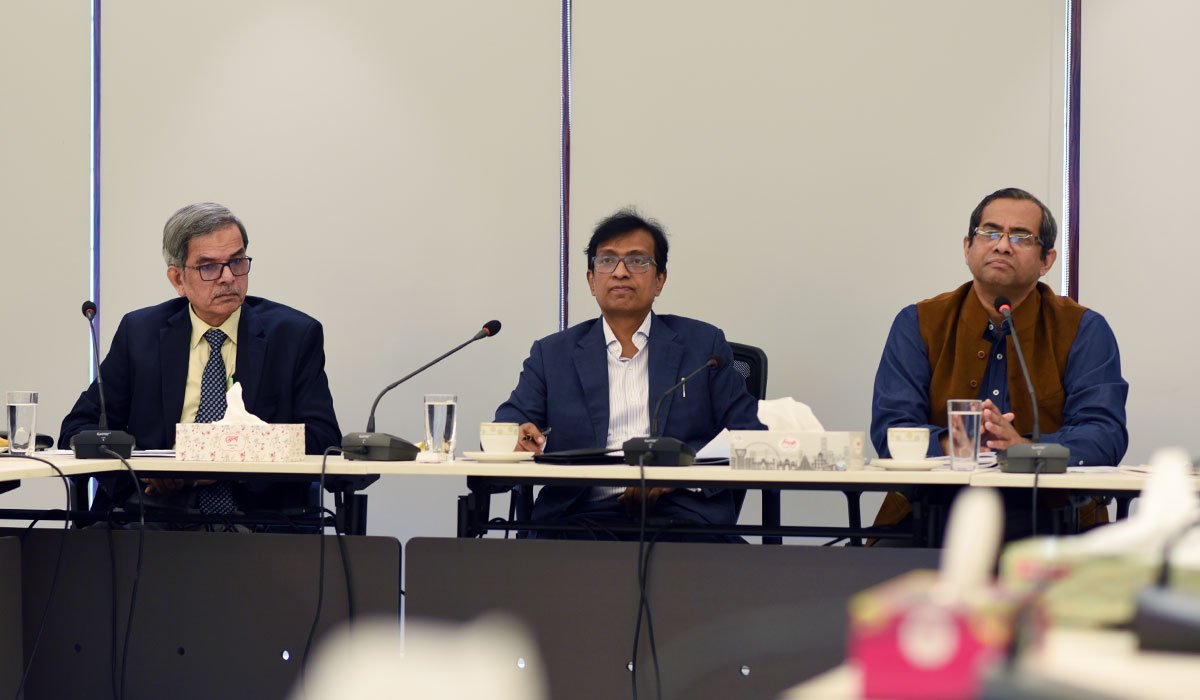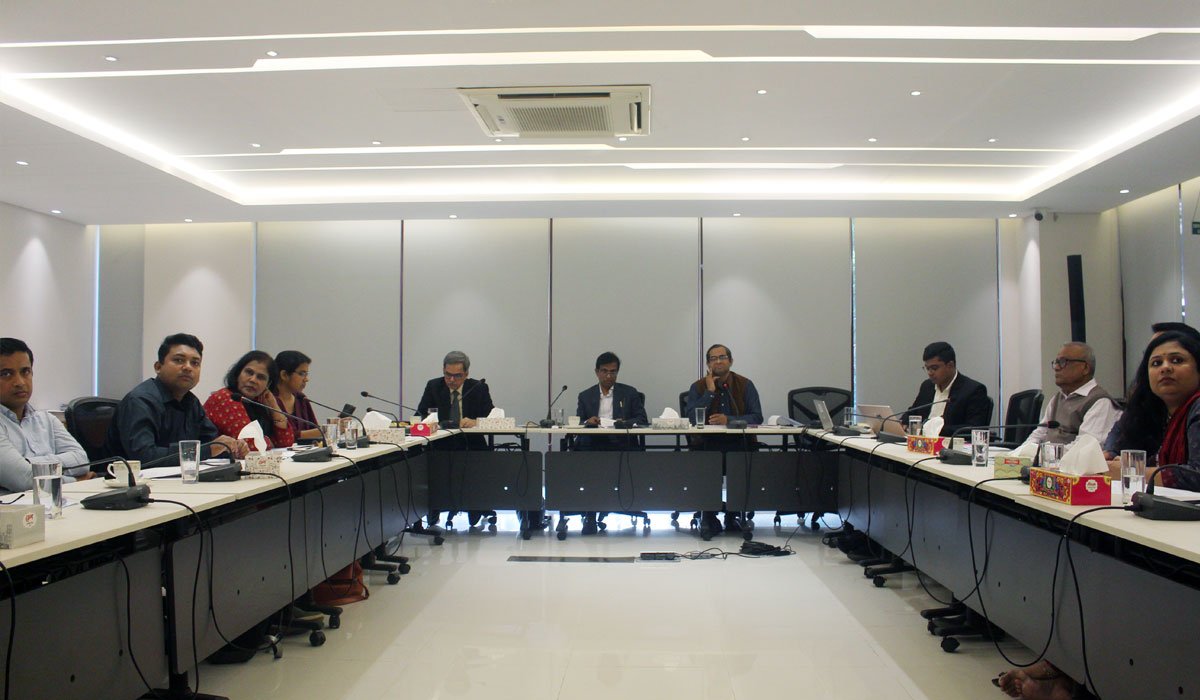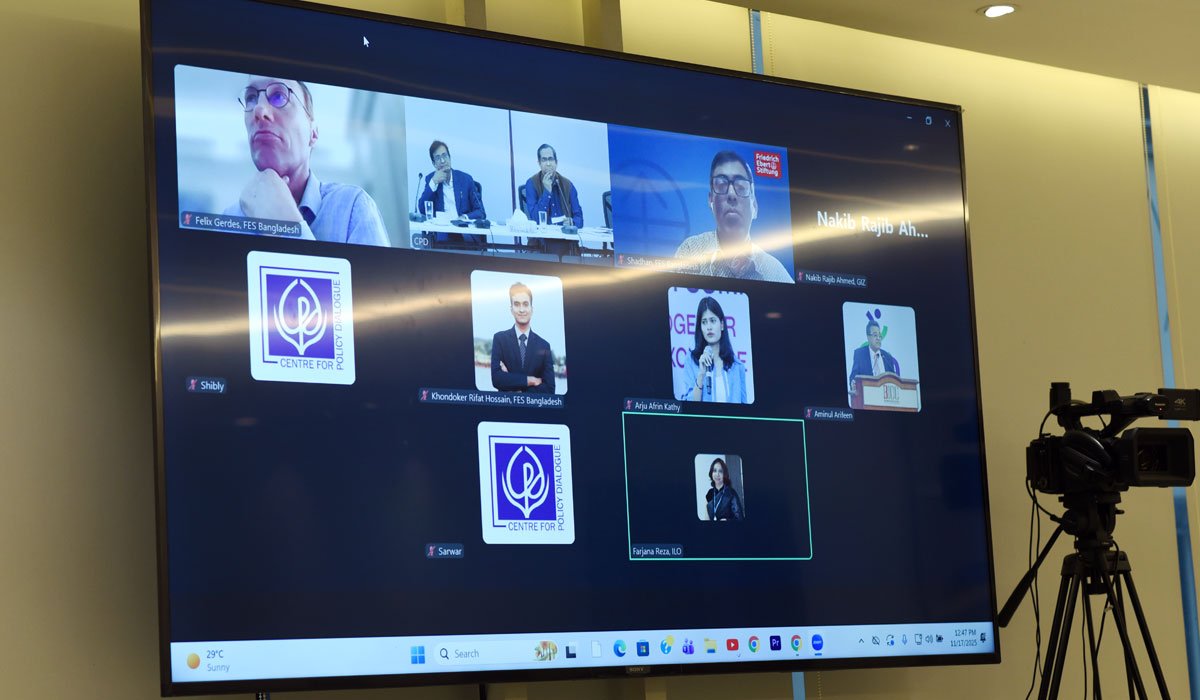
Bangladesh’s long-discussed Unemployment Insurance (UI) scheme has gained renewed urgency as experts stressed the need for a dedicated law and stronger institutions to protect workers facing sudden job loss. The proposed UI framework, seen as a major step toward modernising the country’s social protection system, calls for a standalone Social Insurance Act, a centralised fund, strict compliance mechanisms, and a unified worker database—identified as the key steps forward for the nation.
Held on Monday, 17 November 2025 at the CPD Office in Dhanmondi, the in-house dialogue brought together policymakers, government officials, worker leaders, development partners, insurers, and researchers to discuss findings from the study “Introduction of Unemployment Insurance in Bangladesh: Assessing Legislative and Institutional Readiness.” The event, organised by the Centre for Policy Dialogue (CPD) in collaboration with Friedrich-Ebert-Stiftung (FES) Bangladesh, highlighted the growing relevance of UI within the National Social Security Strategy (NSSS) and the National Social Insurance Scheme (NSIS).
Speaking on the need to streamline scattered policies, Mr Abul Kalam Azad, President, Tannery Workers Union, said, “We have many policies related to employment and reintegration, but they are scattered. These policies must come under a single umbrella so that labour market activation can work in a coordinated way.”

Addressing the pace of progress, Mr Felix Gerdes, Resident Representative, Friedrich-Ebert-Stiftung (FES) Bangladesh, noted, “The timeline for UI was initially more ambitious, but challenges have slowed progress. With a new government coming next year, debates on economic policy and social protection will intensify, making this discussion especially timely.”
Dr Khondaker Golam Moazzem, Research Director at CPD, moderated the session, saying that “UI cannot begin without a solid legal and institutional base, and Bangladesh needs a dedicated law that clearly sets out eligibility, financing, and administrative responsibilities.”
Mr Abu Saleh Md Shamim, Senior Research Associate at CPD, delivered the keynote presentation, highlighting gaps in legislative preparedness, the absence of a central worker registry, weak coordination, and global lessons on benefit delivery and reintegration.
The study noted that Bangladesh still depends on severance and lay-off provisions under the Labour Act 2006, which cannot replace a contributory insurance system. International standards—particularly ILO Conventions 102 and 168—require adequate benefits, transparent financing, and activation measures linking workers to training and employment services. Participants also raised concerns over exclusion risks, trust deficits among workers, and difficulties in verifying employment status in the absence of a coherent national labour database. Development partners stressed the need for strong governance, while unions and employers highlighted implementation challenges.
Looking ahead, proposed actions include establishing a unified Social Insurance Fund, ensuring mandatory NID-linked worker registration, strengthening tripartite oversight, and linking UI benefits with retraining and job-search activities. If implemented effectively, the UI system could become a milestone in strengthening Bangladesh’s social protection landscape.
Highlighting wage concerns for workers, Ms Maheen Sultan, Senior Fellow of Practice, BRAC Institute of Governance and Development (BIGD), commented, “Workers are not earning living wages, so expecting contributions from them is unrealistic unless wages improve. We may begin with the formal sector, but we must not lose sight of informal workers.”
Focusing on financing and governance, Mr Md. Saidul Islam, Additional Secretary-General, Bangladesh Employers’ Federation (BEF), said, “A fair and transparent cost-sharing mechanism is essential. Strict eligibility and proof of involuntary job loss will be needed to prevent misuse.”

Pointing to the absence of a reliable information system, Ms Taslima Akter Lima, President, Bangladesh Garments Sramik Sanghati, remarked, “We cannot support the right workers without accurate information. A transparent and accountable system and a central fund are essential for workers facing unemployment, injury or illness.”
Reflecting on trust issues among workers, Mr Md. Abdus Samad Al Azad, Joint Secretary, Administration Branch, Ministry of Labour and Employment, said, “Workers do not trust that contributions will lead to timely support. Building trust must come before expecting them to contribute.”
On the challenge of identifying eligible workers, Ms Shamima Sultana Hridoy, Deputy Director (Current Charge), Central Fund, MoLE, noted, “There is no system to verify which sector a laid-off worker belongs to. Employers hold a vast amount of data and if shared properly, compensation could be delivered far more effectively.”
Expressing concern about accountability, Ms China Rahman, General Secretary, Federation of Garments Workers, said, “Without proper systems, genuine victims may be excluded while the wrong people are compensated. We need a single stream of worker data.”
Drawing from the pandemic experience, Ms Rehana Akhter Ruma, worker representative, explained, “During COVID-19, funds could not be utilised because databases were weak and incoherent. A strong sector-wise database is essential.”
Calling for innovation, Mr Nakib Rajib Ahmed, Advisor – Knowledge Management, SOSI, GIZ, stated, “We must start the UI scheme and address challenges as they arise. Innovative bridging solutions and clear institutional roles will be crucial.”
Urging clearer commitments, Mr Shadhan Kumar Das, Programme Advisor, FES, said, “The research identified gaps, but without concrete responses from government and businesses, solutions cannot move forward.”
Raising the issue of migrant workers, Mr Md. Alamgir Hossain, Labour Inspector (Safety), DIFE, asked, “UI discussions focus on formal workers, but what about migrants who lose their jobs abroad? They also need protection.”
Bringing in an insurance-sector perspective, Mr Syed Sehab Ullah Al-Manjur, CEO, Pragati Insurance Limited, said, “Insurance requires clear data and risk profiles. We must assess real impacts and contingencies before designing UI products.”
Discussing the role of insurers, Mr Anupam Das, Head of Impact Business, Green Delta Insurance, added, “Insurance has long dealt with risk and trust issues. The sector can play an important role in strengthening resilience under a UI model.”
Reflecting on risk-sharing arrangements, Ms Farjana Reza, National Programme Officer, Social Protection, ILO, commented, “In UI, risk is shared by employers, workers and the government. Integrating private insurance into this structure will require a well-defined mechanism.”
The dialogue ended with a shared understanding that unemployment insurance is no longer an option for Bangladesh but an urgent necessity that must be built on strong laws, reliable data, and unwavering political commitment.


